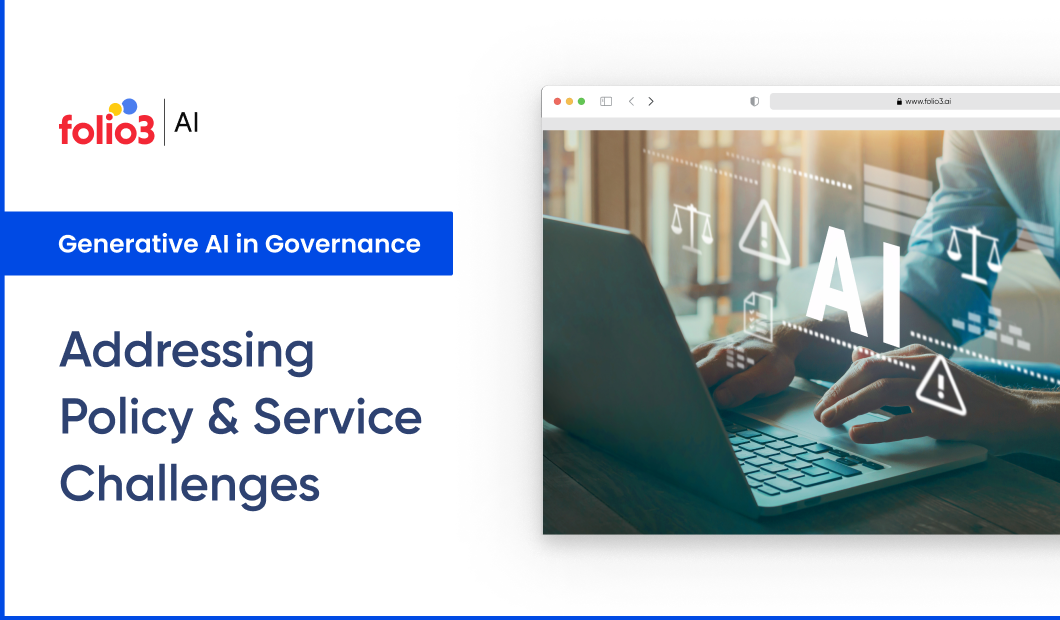Generative AI in Governance is becoming increasingly valuable as governments worldwide seek to refine decisions, transparency, and public engagement. A notable application of Generative AI in governance is improved policy-making and public service delivery.
According to a report by the World Economic Forum, the rapid adoption of generative AI technologies has prompted governments to rethink their governance frameworks to use these innovations effectively while mitigating associated risks.
A survey indicated that 70% of government leaders believe that AI integration revises their decision-making processes and service delivery capabilities.
However, as we navigate this transformative era, the challenge lies in assuring that generative AI is governed responsibly, balancing innovation with ethical considerations to foster equitable outcomes for society. This blog discusses the current challenges in governance and how AI adoption effectively overcomes them.
What’s new on the blog
- Governments face persistent challenges in delivering efficient and transparent public services, including outdated IT systems, resource limitations, and inefficiencies in processing data, which hinder their ability to meet citizens’ growing needs and erode public trust.
- Generative AI is being integrated into systems to address these issues by automating repetitive processes, making sense and creating something new out of vast amounts of data quickly, and decision-making. It rectifies administrative tasks and changes public service delivery.
- By leveraging AI technologies, governments can provide real-time support through virtual assistants, optimize resource allocation, and make rational policy decisions. This results in efficiency and citizen engagement while maintaining trust through greater transparency.
- The integration of generative AI is more than a technological upgrade—it’s a strategic approach to creating responsive, efficient, and transparent governance systems, to have stronger public trust in the future.
Current Challenges in Governance
Governments worldwide face complex challenges in delivering effective and efficient services to their citizens. Managing a large public and ensuring that no injustice occurs is difficult. Often, these challenges stem from outdated systems, resource constraints, and the complexity of managing large-scale public administration.
Here’s an overview of the most pressing issues.
Inefficiency in Service Delivery
Many public sector systems are still based on legacy infrastructure, leading to disorganization in service delivery. This includes long request processing times, delays in issuing permits or licenses, and cumbersome bureaucratic procedures. Citizens often need more support due to slow response times, creating a gap between what people expect from government services and what is delivered.\
Lack of Transparency
In many cases, government processes lack transparency, making it difficult for citizens to understand how decisions are made or how resources are allocated. This can lead to perceptions of corruption, favoritism, or arbitrary decision-making. Without clear visibility into government actions, public trust in institutions erodes, and citizens may feel disconnected from the decision-making process.
Resource Limitations
Governments often face limited resources, including budget constraints, outdated infrastructure, and a lack of skilled personnel. This can hinder the implementation of new technologies, delay important public initiatives, and create a bottleneck in service delivery. Resource limitations also make it challenging for governments to adapt quickly to new demands or emerging issues, such as climate change, pandemics, or economic crises.
Impact of These Challenges on Public Trust and Service Delivery
The challenges mentioned above heavily impact public trust in government and the quality of service delivery.
- Erosion of Public Trust: When citizens experience inefficiency, lack of transparency, or feel that their needs are not being prioritized due to resource constraints, it can erode trust in the government. A lack of accountability and delayed services lead to skepticism about whether the government is truly working in the best interests of the people.
- Decreased Quality of Service Delivery: Inefficient processes and limited resources result in lower-quality public services. Citizens may face longer wait times, incomplete services, or miscommunication from government agencies. This, in turn, undermines the effectiveness of policy initiatives and programs designed to improve social welfare, healthcare, education, and infrastructure.
- Civic Disengagement: As government systems become more opaque and unresponsive, citizens may feel alienated from the decision-making process, leading to lower engagement in civic duties, such as voting or participating in public consultations. This disengagement further exacerbates the issues, creating a cycle of disconnect between the government and the people it serves.
Addressing these challenges requires substantial reform, including the adoption of new technologies, improved communication strategies, and more efficient resource use.
Overcoming these hurdles will help build stronger trust in government and change the perspective of public services.
Therefore, the integration of Generative AI upgrades automates repetitive processes, provides real-time support through virtual assistants, and makes more detailed policy decisions, all amplifying governance’s efficiency and responsiveness.
The Approach of Generative AI in Addressing Challenges in Governance
As governance systems evolve and public needs are growing, the integration of generative AI is becoming indispensable in addressing the most prominent challenges governments face today.
Generative AI aids in data analysis, helping policymakers make leading decisions by synthesizing vast amounts of information and identifying patterns.
However, adopting generative AI in governance isn’t without challenges. Transparency, accountability, and bias remain concerns. To use it effectively, governments need ethical frameworks. These ensure responsible use, protect rights, and build trust. When addressed, AI can transform governance.
- It provides real-time support through virtual assistants.
- It optimizes resource allocation for better efficiency.
- It helps make informed, data-driven decisions.
This isn’t just AI technology being used for improvement—it’s a strategy for development. Generative AI guarantees transparency, solidifies trust, and creates smarter, more responsive systems. The steps below discuss how.
1. Efficiency in Service Delivery
Generative AI automates outdated infrastructure systems to reduce waiting time, such as processing forms, managing public inquiries, and drafting standard communications. These AI-powered systems quickly analyze large volumes of data, generate reports, and assist in decision-making processes, significantly speeding up administrative tasks. This automation reduces the burden on government employees and shortens the time citizens need to wait for services, improving overall efficiency.
Example: AI-driven chatbots or virtual assistants are available 24/7 to citizens – providing instant responses to frequently asked questions, filing complaints, or guiding them through complex processes, such as applying for permits or submitting tax filings.
2. Transparency in Decision-Making
Generative AI makes government processes more transparent by giving citizens real-time updates on policy decisions, project statuses, and resource allocation. Through AI-generated insights and data visualizations, governments can share complex information in an easily digestible format, making the decision-making process more accessible and understandable to the public.
Example: AI tools analyze and present data on how government funds are spent on the public sector, providing detailed reports on the progress of public projects and enabling citizens to track the effectiveness of policies.
3. Optimizing Resource Allocation
Resource limitations often represent a major governance challenge. Generative AI can assist in optimizing resource allocation. By analyzing historical data and predicting future needs, AI can help governments allocate resources more effectively, ensuring that funds and personnel are deployed in the most impactful areas.
Example: In public healthcare, AI can forecast demand for medical services, predict resource shortages, and suggest the optimal distribution of healthcare professionals, supplies, and equipment.
4. Reducing Bias and Increasing Fairness
Generative AI diminishes bias in decision-making. The algorithms analyze large, diverse datasets and guarantee that policies are based on objective, data-driven insights. This is especially important in public hiring, welfare distribution, and law enforcement, where fairness and equity are crucial.
Example: AI models find patterns of inequality in service delivery or public policy, allowing governments to adjust their approach to ensure fairer outcomes for all citizens.
5. Boosting Public Trust
Generative AI restores and builds public trust by improving the transparency, efficiency, and fairness of government processes. When citizens see that decisions are being made based on clear, data-driven insights and that services are being delivered faster and more equitably, they are more likely to have confidence in their government.
Example: AI-powered systems that provide instant, transparent communication with citizens about the status of applications or complaints can reassure the public that their concerns are being addressed promptly and fairly.
6. Facilitating Data-Driven Policy Making
Generative AI can process and analyze vast amounts of data, providing policymakers with valuable insights to craft more effective and targeted policies. By simulating potential outcomes of different policy options, AI can help governments make data-driven decisions, leading to better outcomes for citizens.
Example: AI can analyze economic, social, and environmental data to predict the impact of policies on different population groups, allowing policymakers to tailor solutions to the needs of the public.
Developing a Generative AI Governance Strategy
Here are five key elements to developing a generative AI governance strategy.
- Establish Clear Objectives: Define specific goals for AI use within governance, such as updating systems and service delivery.
- Ensure Ethical Standards: Create guidelines to ensure AI systems operate fairly, without bias, and protect citizens’ privacy, ensuring adherence to ethical principles.
- Promote Transparency and Accountability: Make certain AI decision-making processes are transparent and open to public scrutiny to build trust and maintain accountability.
- Create a Regulatory Framework: Develop legal guidelines that set clear responsibilities, define the scope of AI applications, and ensure compliance with ethical standards.
- Monitor and Evaluate AI Impact: Continuously assess the performance and impact of AI systems to verify they are meeting objectives, remain aligned with public interests, and are adjusted as needed.
Case Studies of Generative in Governance
E-Governance in Estonia
Estonia, a global leader in digital governance, augmenting AI in its e-Estonia platform to automate key administrative processes. Using AI algorithms, the system facilitates quick business registrations, processes tax returns, and delivers tailored citizen services.
For example, AI-generated insights have optimized resource allocation in public projects, saving costs and improving efficiency. This approach has enhanced transparency, fostering trust between citizens and the government.
AI in Urban Planning – Singapore’s Smart Nation Initiative
Singapore’s Smart Nation initiative uses generative AI to enhance urban planning and optimize public services. The government employs AI algorithms to analyze traffic patterns, predict future infrastructure needs, and optimize resource allocation for public services like waste management and energy usage. By utilizing AI, Singapore has improved the efficiency of public systems, minimized congestion, and reduced the environmental impact of urbanization, all while providing a more responsive and sustainable city.
Stay Ahead in AI Regulatory Influence in 2025
As we approach 2025, staying ahead of AI regulatory influence will be crucial for businesses and governments alike. With AI rapidly transforming industries, the need for clear and effective regulations is becoming more urgent. Key global regions, including the European Union, the United States, and China, are already setting the stage for AI regulation, focusing on areas like ethics, privacy, security, and accountability. By understanding these regulatory frameworks early, businesses can ensure compliance, mitigate risks, and build trust with customers and stakeholders.
Here’s how the government can stay proactive.
- Monitor Global AI Regulations: Keep track of evolving policies in key regions, especially around ethics, privacy, security, and transparency.
- Adapt to AI Transparency Standards: Ensure that AI systems provide explainable and transparent decision-making processes, which will be central to regulatory compliance.
- Prioritize Fairness and Accountability: Develop AI models that are fair, unbiased, and accountable to prevent legal and reputational risks.
- Focus on Data Privacy and Security: With regulations like GDPR and others in place, protecting data will remain a top priority.

Dawood is a digital marketing pro and AI/ML enthusiast. His blogs on Folio3 AI are a blend of marketing and tech brilliance. Dawood’s knack for making AI engaging for users sets his content apart, offering a unique and insightful take on the dynamic intersection of marketing and cutting-edge technology.










